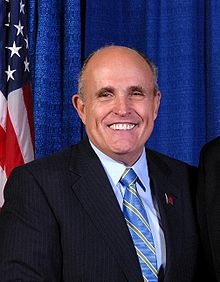Thoughts on a 9-11 anniversary interview with Rudy Giuliani

This morning I read Steve Forbes’ interview of Rudy Giuliani, who recalled his experiences and reactions on September 11. It is lengthy, but very worth reading. You can read it here.
For those not familiar with his actions that day, Giuliani was incredibly brave. He went directly to the site (always his habit as mayor in large-scale emergencies). His recollections of his own initial denial at seeing human beings hurl themselves from hundreds of stories to escape their agony reinforces what some would like to forget: that the nature of these attacks was so savage, that their targeting of civilians reflected a hatred and fanaticism on the part of the extremist Muslim perpetrators that knows no reason and cannot be reasoned with.
Giuliani also talks about his anger in the interview. He says that, when President Bush asked him in the days following 9/11 what he, as President, could do to help Giuliani manage, Rudy said, “When you catch bin Laden, I’d like to execute him.”
In this interview Rudy says something to the effect that his own blurted words surprised him. To me, they reflect an emotion that is understandable given the circumstances.
Americans are not a vindictive or thoughtless people. Unlike our enemies, we do not generally indulge in vilification of people as members of groups. That is perhaps as important as survival itself. But when human beings are viciously attacked, it is natural to become angry and direct the anger in a productive way. In other words, the creed of turning the other cheek, while it may have value in some circumstances, in situations where innocent people are being attacked, is inappropriate and arguably even twisted. Giuliani’s anger at bin Laden and desire to kill him are a sign of mental health.
I worry about people who do not feel anger at those who attacked us. I worry about that and think the subsequent demonizing of George Bush–whatever his mistakes and inadequacies–reflected a kind of sickness–not unlike the battered wife who blames herself (what did I do to provoke him?) rather than the abuser.
To be sure, we are imperfect. But Americans’ by and large ethical and frankly upstanding behavior toward our Muslim-American citizens in the aftermath of September 11 gives the lie to the idea that this society is generally intolerant. The other day, while reporting a piece for the New Jersey Jewish Standard, I came across the FBI’s hate crime statistics for 2009. These are compiled each year from police departments across the country.
Turns out, by far the largest proportion of anti religious hate crimes in the U.S. in 2009 were directed against Jews and Jewish institutions, with Jewish victims accounting for 71 percent of anti-religious hate crimes that year. 8.4 percent of the victims of such anti-religious hate crimes were Muslims. 3.7 percent were Catholics. (Regarding hate crimes generally, blacks were victims most often, but in this post I am dealing exclusively with anti-religious hate crime).
Glancing back, this trend is consistent. In 2006, for instance, 65.4 percent of victims of anti-religious hate crimes in the U.S. were Jews; 11.9 percent were Muslims. Going back still farther to the days immediately following 9/11, in 2002 (when the FBI seems to have been compiling these numbers without calculating the percentage), there were 931 Jewish victims of anti-religious hate crimes reported in the U.S., 155 Muslim victims, 53 Catholic victims and 55 Protestants.
The point of this is not to dismiss the seriousness of any hate crime against anyone. But these numbers seem to illustrate a few points.
For one, while there does appear to have been a slight increase in anti-Muslim hate crime immediately after 9/11, the good news is it has tapered off. That would seem to suggest that, by and large, Americans do not blame innocent Muslims or strike out against them because of the actions of the worst extremists who claim their mantle. This appropriate wisdom and decency is, while the least that should be expected of us, still far more than many peoples would exhibit after such a large scale attack and ongoing threat.
Second, anti-Semitic hatred, while not common in the U.S., does still exist here and is a problem that seems to be growing. By the numbers, it is frankly a significantly larger problem than anti-Muslim hatred. While the FBI does not release statistics on the background of perpetrators, anecdotal evidence would suggest that in some cases, this hatred is being fomented by the same group that did 9/11–extremist Muslims.
On the whole, our leaders, including President Bush and President Obama-have set a tolerant tone and deserve credit, as do most of the American people, for not giving in to group think or the kind of mass hysteria that would be, while ugly and shameful, not surprising in the face of such vicious attacks as 9/11. But just as it is incumbent on us, as a matter of decency, to judge individuals based on their behavior and not paint with too broad a brush, so it is important to recognize true hatred where it exists, and to deal with it straight on. That means putting undercover agents in some mosques when there is evidence that extremist violence is being incited there, for instance. It means careful and lawful, but aggressive, law-enforcement.
At any rate, this New Yorker still remembers with gratitude Rudy’s courage and clarity on a day that will live in infamy.
This entry was written by Heather Robinson and posted on September 10, 2011 at 3:34 pm and filed under Blog. permalink. Follow any comments here with the RSS feed for this post. Keywords: Muslim-Jewish-relations, President-Obama, terrorism. Post a comment or leave a trackback: Trackback URL. */?>



